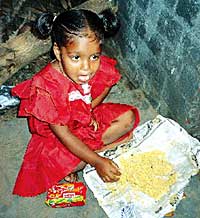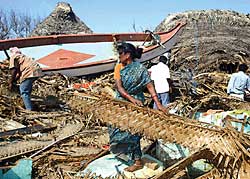 It was like any other beautiful day on the stretch of beach near Chennai. The breeze from the Bay of Bengal was bracing, the sun glistened off the azure ocean. The palm fronds swayed.
It was like any other beautiful day on the stretch of beach near Chennai. The breeze from the Bay of Bengal was bracing, the sun glistened off the azure ocean. The palm fronds swayed. The only thing missing was the presence of human beings. The nearby village of Tarang Badi was almost completely destroyed on the morning of 26 December. A week after the disaster, the few survivors of the village have moved to camps inland and they all have tales of horror and miracles.
Prabhakaran was hit by the wave when he was out in the sea and saw his daughter, Mubbi, on the shore. He tried to get to her but the water engulfed him and he lost consciousness. "Some villagers saved me and they told me later that my dog Ramu saved my daughter," says Prabhakaran. Ramu had waded out as the waves receded to drag the floating Mubbi by the hair and out of the water. "Many people say God saved them but in my daughter's case it was my dog " says Prabhakaran. Today, Ramu is treated like a family member.
What is surprising is how normal everything looks here. The beach-side resort is surprisingly intact, the temple is still standing, the deep blue ocean and the golden sand look idyllic. Then you see the fishing village, just a jumble of timber, thatch and debris. And the overpowering stench of rotting flesh as you approach the village.
As we walked along the beach, we came across a group of people in masks throwing what looked like sacks on the back of a tractor. Closer, we realised they were piling the bodies of babies from the beach. I saw the bloated body of a child who must have been three. A little hand was sticking out of the side of the trailer from under a pile of corpses.
I
 have seen many horrors of natural and manmade disasters while working in Nepal, Afghanistan and in the aftermath of the earthquake in the Iranian city of Bam exactly a year ago (see: 'A future foretold', #183). But nothing prepared me for this sight. I broke down on the side of the road and wept. My colleagues consoled and patted me, they let me get it out of my system. Just when you think that as a professional you are inured to the sight of human suffering, it hits you when you least expect it.
have seen many horrors of natural and manmade disasters while working in Nepal, Afghanistan and in the aftermath of the earthquake in the Iranian city of Bam exactly a year ago (see: 'A future foretold', #183). But nothing prepared me for this sight. I broke down on the side of the road and wept. My colleagues consoled and patted me, they let me get it out of my system. Just when you think that as a professional you are inured to the sight of human suffering, it hits you when you least expect it. The scale of the disaster is much worse than we expected. When the news first broke of an earthquake in Indonesia on Sunday morning, we didn't take much notice. Then the tv images started coming in, but even the next day the true extent of the tragedy had not sunk in. By Monday, I was told to cancel my holidays and fly out to Chennai that night. On Wednesday morning we headed straight out along the beach road that brought us to Naggapattinam.
This is one of the worst affected regions of southern India and 45 women were killed on just a few hundred metres of shoreline here. "We were working on the beach taking the fish out of the nets when the waves arrived," one survivor told us. Their bodies were recovered only the next day.
We heard many stories of miraculous escapes but a lot more stories of children being washed away. Almost everywhere, it was the children who either couldn't outrun the waves or were wrested away from the arms of their parents.
A mother and three of her children were sitting down for breakfast in Nagapatanam when the wave hit. They clung to each other, but the force of the water separated her son, who was never found. The trauma and guilt of the ordeal has left the mother muttering that her son has just gone down the road to buy some sweets. Although there is now almost no hope her son is alive, she has convinced herself he'll return.
Along the coast is the village of MGR where I saw a soggy unopened envelope, it was a letter from a certain Karunasaran in Riyadh to a Mr Kabitarma in the same village. I asked around but no one seemed to know of the man. I wrote a letter to Karunasaran explaining where I found his letter and of the conditions I saw in MGR and posted it to the return address in Saudi Arabia.
In camp after camp, the survivors sit listlessly staring vacantly at the sea. Some find it comforting just to talk and tell of how their lives turned upside down in the space of a few minutes. Many are too traumatised even to pray. The real problem for the survivors is to surviving the aftermath. The water is contaminated and the wells and reservoirs need to be cleaned up. Hundreds of thousands of people have lost not just their relatives but all their possessions too. No clothes, no beds, no utensils, no food, no livestock, no nets and no boats. Aside from the psychological trauma of bereavement and shock, many are wounded and the wounds are getting infected.
But there are rays of hope, heart-warming scenes of generosity and altruism. Thousands of volunteers from all over India have come to work in food distribution, doctors are running clinics in the camps and villages. Along the beaches, some fishermen are already trying to rebuild their houses salvaging what they can from the debris. Most fishing catamarans have been destroyed but some fishermen are trying to find new boats to go out to sea again. "What else can we do, the sea brought death but it is also our life," says one fisherman with a feeble smile.
Even after a disaster like this, life limps on.
 Aruna Upreti is a Nepali doctor who works for Oxfam GB and will be based in Chennai for the next few months.
Aruna Upreti is a Nepali doctor who works for Oxfam GB and will be based in Chennai for the next few months. 

